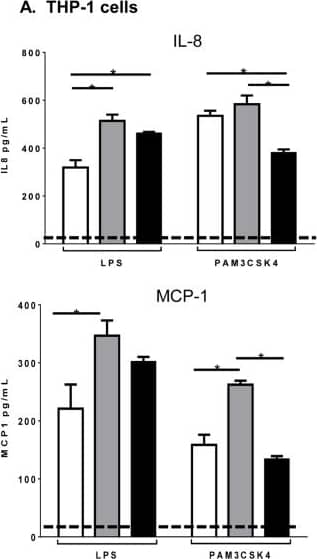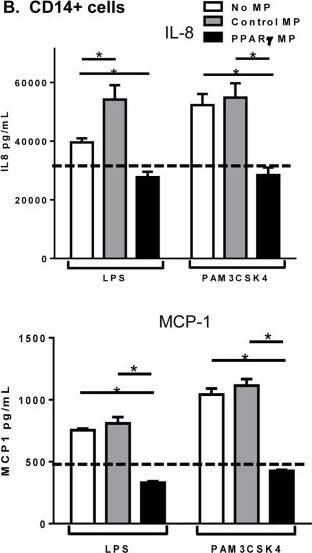Human CCL2/JE/MCP‑1 Biotinylated Antibody
R&D Systems, part of Bio-Techne | Catalog # BAF279


Key Product Details
Validated by
Species Reactivity
Validated:
Cited:
Applications
Validated:
Cited:
Label
Antibody Source
Product Specifications
Immunogen
Gln24-Thr99
Accession # P13500
Specificity
Clonality
Host
Isotype
Scientific Data Images for Human CCL2/JE/MCP‑1 Biotinylated Antibody
Detection of Human CCL2/JE/MCP-1 by ELISA
Microparticle composition influences inflammatory cytokine production from activated monocytes.THP-1 cells (A) or CD14 sorted blood monocytes (B) were treated with control microparticles (grey bars) or PPAR gamma-overexpressing microparticles (black bars) or no microparticles (white bars) for 4 hours before activation with LPS or PAM3CSK4 for 24 hours. Supernatants were collected and pro-inflammatory cytokines IL-8 (top), MCP-1 (bottom) were measured by ELISA. Dotted line represents baseline cytokine production from unactivated cells with no microparticle exposure. Mean values with standard errors represent one of at least 3 experiments. Two-way ANOVA with Tukey's multiple comparison post test was performed to determine statistical significance. * indicates (p<0.05). Image collected and cropped by CiteAb from the following publication (https://pubmed.ncbi.nlm.nih.gov/25426628), licensed under a CC-BY license. Not internally tested by R&D Systems.Detection of Human CCL2/JE/MCP-1 by ELISA
Microparticle composition influences inflammatory cytokine production from activated monocytes.THP-1 cells (A) or CD14 sorted blood monocytes (B) were treated with control microparticles (grey bars) or PPAR gamma-overexpressing microparticles (black bars) or no microparticles (white bars) for 4 hours before activation with LPS or PAM3CSK4 for 24 hours. Supernatants were collected and pro-inflammatory cytokines IL-8 (top), MCP-1 (bottom) were measured by ELISA. Dotted line represents baseline cytokine production from unactivated cells with no microparticle exposure. Mean values with standard errors represent one of at least 3 experiments. Two-way ANOVA with Tukey's multiple comparison post test was performed to determine statistical significance. * indicates (p<0.05). Image collected and cropped by CiteAb from the following publication (https://pubmed.ncbi.nlm.nih.gov/25426628), licensed under a CC-BY license. Not internally tested by R&D Systems.Applications for Human CCL2/JE/MCP‑1 Biotinylated Antibody
Western Blot
Sample: Recombinant Human CCL2/JE/MCP-1 (Catalog # 279-MC)
Human CCL2/JE/MCP-1 Sandwich Immunoassay
Reviewed Applications
Read 2 reviews rated 4.5 using BAF279 in the following applications:
Formulation, Preparation, and Storage
Purification
Reconstitution
Formulation
Shipping
Stability & Storage
- 12 months from date of receipt, -20 to -70 °C as supplied.
- 1 month, 2 to 8 °C under sterile conditions after reconstitution.
- 6 months, -20 to -70 °C under sterile conditions after reconstitution.
Background: CCL2/JE/MCP-1
CCL2, also known as monocyte chemotactic and activating factor (MCAF), was initially purified independently by two groups based on its ability to chemoattract monocytes. Subsequent to its cloning and sequencing, it became evident that this protein is also identical to the product of the human JE gene. The JE gene, originally identified in mouse fibroblasts, is a platelet-derived growth factor (PDGF)-inducible gene. The human CCL2 cDNA encodes a 99 amino acid residue precursor protein with a 23 residue hydrophobic signal peptide that is cleaved to generate the 76 residue mature protein. Natural CCL2 is heterogeneous in size due to the addition of O-linked carbohydrates and sialic acid residues. In addition to fibroblasts; tumor cells, smooth muscle cells, endothelial cells, and mononuclear phagocytes can also produce CCL2 either constitutively or upon stimulation by various stimuli. CCL2 is a member of the beta (C-C) subfamily of chemokines. The existence of MCP-2 and MCP-3 with 62% and 73% amino acid identity respectively, to CCL2 have been reported.
Consistent with it being a member of the chemokine beta family, CCL2 has been shown to chemoattract monocytes. In addition, it will also activate monocytes to be cytostatic for some human tumor cell lines; to increase cytosolic free calcium; to generate and release monocyte superoxide anions and to release monocyte lysosomal enzymes in vitro. CCL2 was reported to be capable of regulating adhesion molecule expression and cytokine production in human monocytes as well as chemoattracting, activating, and inducing histamine release from basophils. The biological roles played by CCL2 in a number of inflammatory and non-inflammatory disease states characterized by the accumulation of leukocytes at the site of the lesion, including atherosclerosis, delayed hypersensitivity reactions, etc., are being determined. CCL2 can bind to the C-C chemokine receptor-1 that also binds MIP-1 alpha, RANTES and MIP-1 beta. A specific receptor for CCL2 has also been cloned from THP-1 and MonoMac 6 cells.
Alternate Names
Gene Symbol
UniProt
Additional CCL2/JE/MCP-1 Products
Product Documents for Human CCL2/JE/MCP‑1 Biotinylated Antibody
Product Specific Notices for Human CCL2/JE/MCP‑1 Biotinylated Antibody
For research use only
